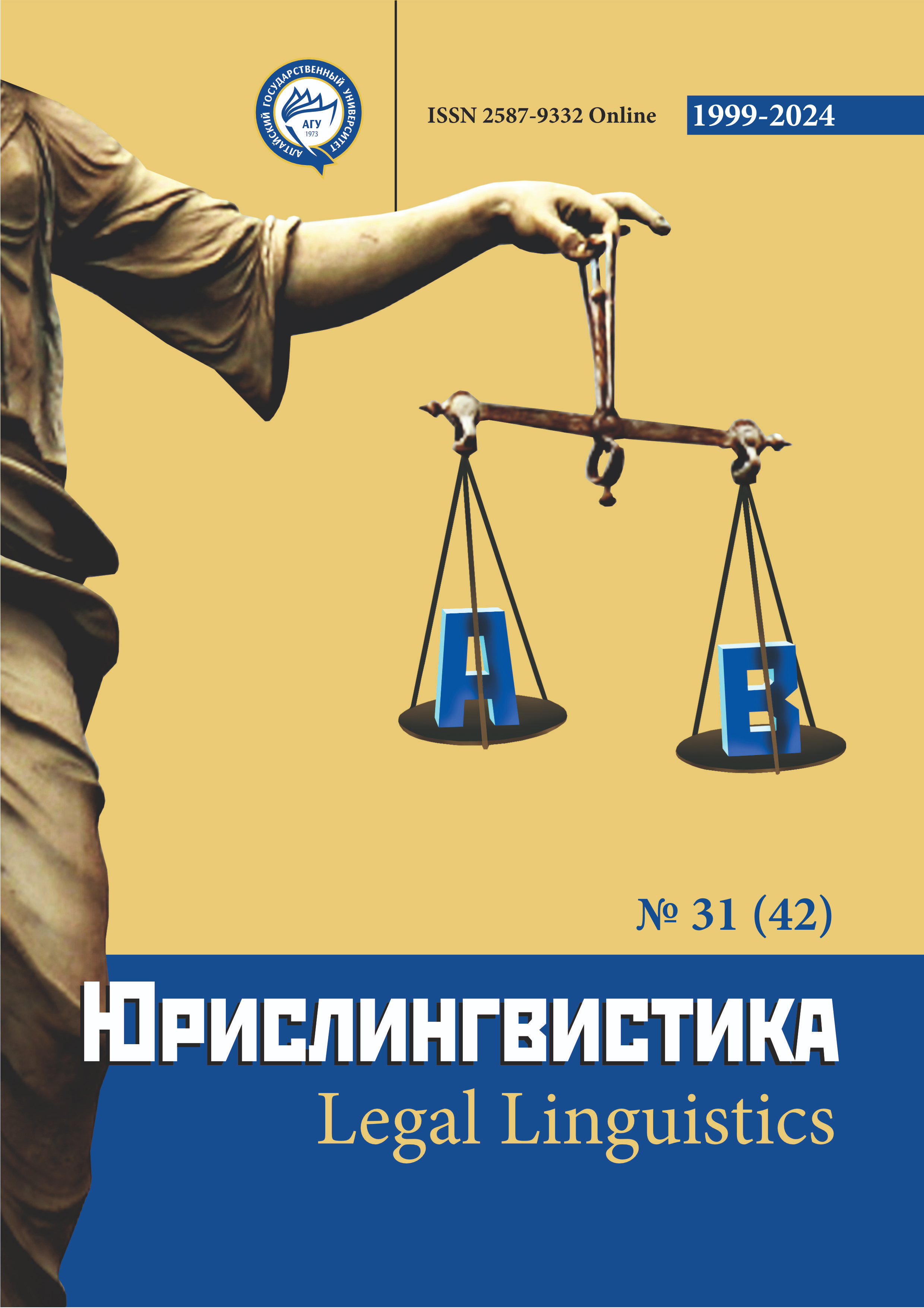Linguocognitive Modeling of Defensive Speech in Modern Legal Proceedings
УДК 811.161.1'42, ББК 81.055.1
Abstract
Cognitive structures which determine text unfolding and its interpretation, as well as efficiency of communication in general, can be reconstructed through systematizing and conceptual analysis of language units employed by trial lawyers. This hypothesis has been confirmed by the research dealing with language processes of developing texts of defensive speeches in current Russian proceedings.
The purpose of the article is to characterize the strategies of linguocognitive modeling of defensive speech and their linguistic representations. As research material the author uses the defensive speeches of modern court speakers of the end of the XX and the first quarter of the XXI century. The peculiarities of defensive speech composition have been revealed through the technique of studying interactive communication of trial participants, special attention given to strategic application of professional discourse. The main characteristics of the text of the defense speech are multi-vector dialogization, that is, the simultaneous orientation of speech to two different addressees – the court and the prosecution, and intertextuality as a dialogic interaction with various legal texts. The structure and peculiarities of unfolding of a text of defensive speech are determined by several situation models. It is established that linguocognitive modeling of defensive speech is carried out on the basis of cognitive stereotypes of legal discourse and at the same time obeys individual pragmatic goals. The results obtained can be used in text theory, as well as in teaching the academic disciplines “Judicial eloquence” and “Oratory” to students and undergraduates of law faculties of universities.
Downloads
Metrics
References
Александров А. С. Юридическая техника – Судебная лингвистика – Грамматика права. / Уголовное судопроизводство. – 2006. – №3. – С. 4-7.
Ария С. Л. Жизнь адвоката. Издание 3-е, дополненное и исправленное. М., 2010.
Батюшкина М. В. Законодательные клише: специфика, виды и функции / Юрислингвистика. – 2023. – 27. – С. 7-14.
Губаева Т. В. Язык и право. М., 2003.
Дейк Т. А. ван. Язык. Познание. Коммуникация. Благовещенск, 2000.
Кибрик А. Е. Лингвистическая реконструкция когнитивной структуры / Вопросы языкознания. – 2008. – № 4. – С. 51-77.
Речь адвоката Г. М. Резника по делу журнала «Наш современник». URL: http://www/ rusexpert.ru/>public/news/30/11/2017-2pdf
Сборник работ Всероссийского конкурса профессионального мастерства среди адвокатов и стажеров адвокатов в честь 100-летия со дня рождения С. Л. Арии. М., 2023.
Слово Генриха Падвы и Елены Левиной в защиту подсудимого Анатолия Быкова. 2003. URL: http://regnum.ru
Федорченко Е. А. Лингвокогнитивные аспекты моделирования текста в сфере современного судопроизводства (на материале речей российских адвокатов) / Проблемы концептуализации действительности и моделирования языковой картины мира. – М.; Северодвинск, 2015. – С. 50-56.
Федорченко Е. А. Языковые клише в юридическом тексте как особый вид манифестаций когнитивных структур / Проблемы концептуализации действительности и моделирование языковой картины мира. – Вып.6. – М.; Архангельск, 2013. – С. 113-117.
Copyright (c) 2024 Евгения Федорченко

This work is licensed under a Creative Commons Attribution 4.0 International License.
The authors, which are published in this journal, agree to the following conditions:
1. Authors retain the copyright to the work and transfer to the journal the right of the first publication along with the work, at the same time licensing it under the terms of the Creative Commons Attribution License, which allows others to distribute this work with the obligatory indication of the authorship of this work and a link to the original publication in this journal .
2. The authors retain the right to enter into separate, additional contractual agreements for the non-exclusive distribution of the version of the work published by this journal (for example, to place it in the university depository or to publish it in a book), with reference to the original publication in this journal.
3. Authors are allowed to post their work on the Internet (for example, in a university repository or on their personal website) before and during the review process of this journal, as this may lead to a productive discussion, as well as more links to this published work (See The Effect of Open Access).











